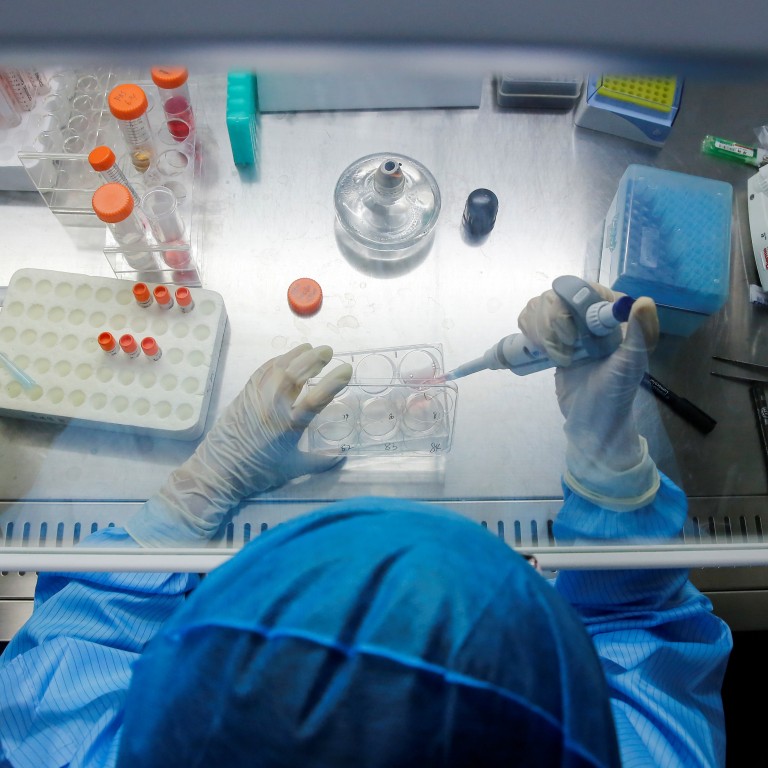
Shanghai tech board unlikely to challenge Hong Kong’s status as preferred IPO hub for Chinese biotech firms
- Investment bankers say US-China trade war may dampen valuations of biotech firm IPOs in Hong Kong, but overall numbers likely to remain intact
- While Chinese biotech companies are likely to opt for Hong Kong, advanced medical equipment makers may prefer new Shanghai board
Volatile stock markets as a result of the unresolved US-China trade war will affect the valuations of Chinese biotech IPOs, but Hong Kong’s status as an IPO hub will remain undiminished and compete strongly with the upcoming tech board in Shanghai, say investment bankers.
“The funds available here and in China are incredibly deep, I anticipate that this market should hold as it goes through the ups and downs,” said Philip Ross, JPMorgan’s vice-chairman of investment banking with a focus on health care. “It may temper valuations but I don’t think it will prevent companies from going public.”
He expects at least 10 Chinese biotech firms to go public in Hong Kong or Shanghai’s new Science and Technology Innovation board in the coming 12 to 18 months.
Listing reform by bourse operator Hong Kong Exchanges & Clearing (HKEX) has allowed biotech start-ups without profit or even revenue to go public in the city since late April last year.

Rule changes in Shanghai will also see the first batch of initial public offerings of pre-profit companies in semiconductors, biotech, artificial intelligence and advanced manufacturing sectors, on the new Science and Technology Innovation board this month.
The Loncar China BioPharma Index that tracks 23 Hong Kong-listed and six Nasdaq-listed firms has fallen 9.1 per cent in the past month, compared to a 8.8 per cent decline of the Hang Seng Index.
Has Hong Kong’s new IPO listing regime lived up to expectations?
Richard Chang, a Hong Kong-based lawyer with international law firm Goodwin Procter active in advising life sciences firms on IPO preparations, said the Hong Kong biotech deals pipeline is “healthy”.
He added that some large IPOs expected to raise at least US$1 billion are expected to be launched soon.
Kevin Xie Yijing, investment bank China Renaissance’s co-founder and head of health care and life science, said he expects up to 20 Chinese biotech firms to go public either on Nasdaq or Hong Kong in the next two years, with up to three-quarters going for the latter. Most drug developers will first consider Hong Kong which has already proven its capability to raise funds for them.
On the prospects of Shanghai’s new board, he said that he expects mostly medical technology firms to pursue listings here.

HKEX chief executive Charles Li Xiaojia unveiled a goal just over a year ago for HKEX to overtake Nasdaq in terms of listings and market capitalisation for Chinese biotech firms by April 2023.
He said that 10 IPOs were in the pipeline without elaborating at HKEX’s Biotech Week on Wednesday.
Some US$8.5 billion was raised from 68 IPO deals in the US from January 2018 to May 9 this year, compared to US$3 billion in seven deals in Hong Kong in the same period, according to Dealogic data cited by JPMorgan.
While Nasdaq-listed biotech firms have raised US$3.5 billion from 32 post-IPO “follow-on” share issuances in the period, none has been recorded in Hong Kong yet.
“I am less concerned on whether the company raised money above or below the IPO price, what I care about is [continued] access to capital which is oxygen for biotech firms,” Ross said.
Follow-on share offerings will help improve Hong Kong biotech stocks’ liquidity and are important for the city to be viewed as a “durable” biotech listing market for issuers and shareholders, he added.
It takes on average a decade and more than US$1 billion to bring a drug from research to market, industry executives have said.
While Hong Kong’s biotech market has not yet seen a late-stage clinical trial failure, Xie said most investors should be prepared for this since it is an industry norm.
He added that investors should be prepared for price volatility where share prices of companies are talked up even before late-stage trial results, as it could lead to panic selling and cause sharp swings if the drug trials fail.
For instance, London-based Axovant Sciences which went public in 2015, saw its shares plummet 74 per cent on September 26, 2017, after it failed to meet the main goals of a late-stage trial on an Alzheimer’s drug.
The best ways of climbing aboard the biotech investment bandwagon
Even established pharmaceutical firms have seen sell-offs on trial failures, although they tend to recover because of their large and diversified development pipelines.
US giant Eli Lilly shares fell 10.5 per cent on November 22, 2016, on news of a failure in a large phase three trial on Alzheimer’s patients.
Xie said since Hong Kong’s biotech stocks trading is driven by international institutional investors compared to some other markets like Taiwan that have also attempted to become a biotech listing hub, investors here are likely to better handle trial failures.


